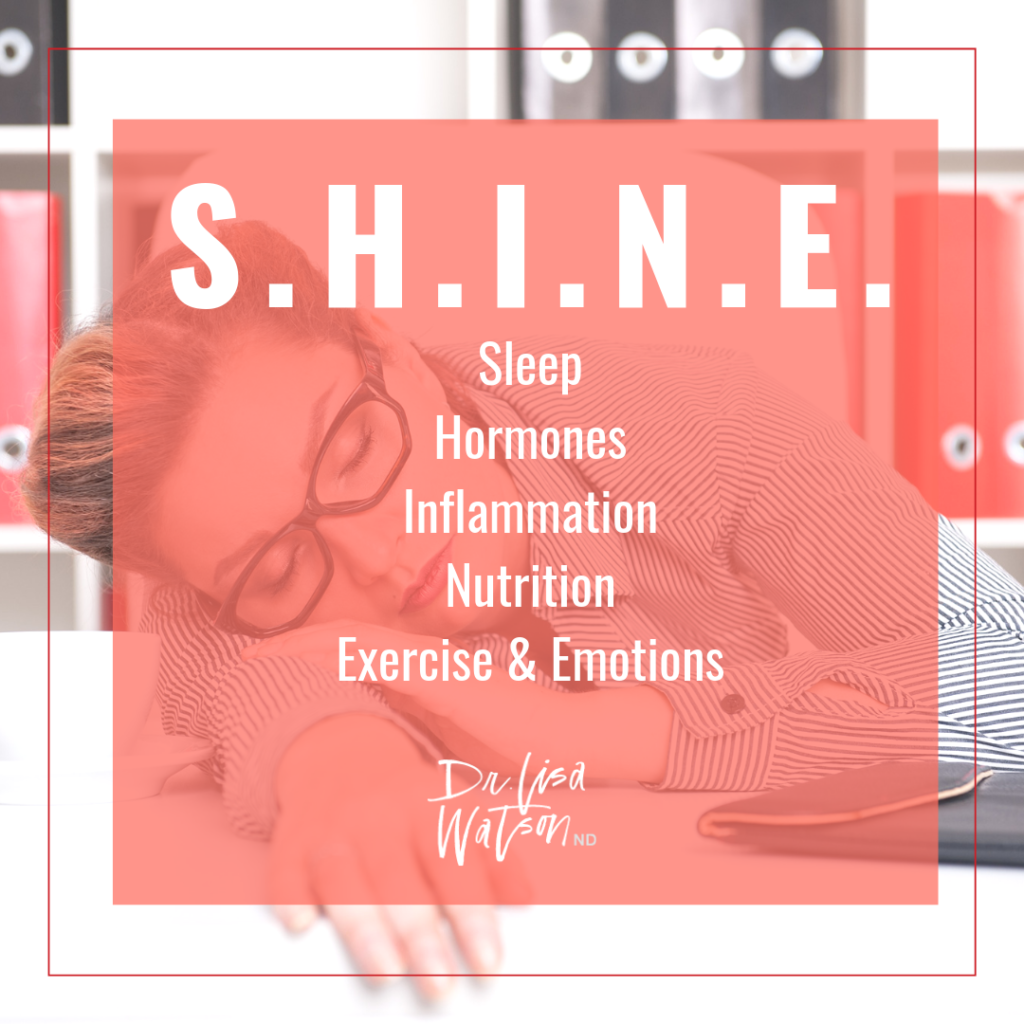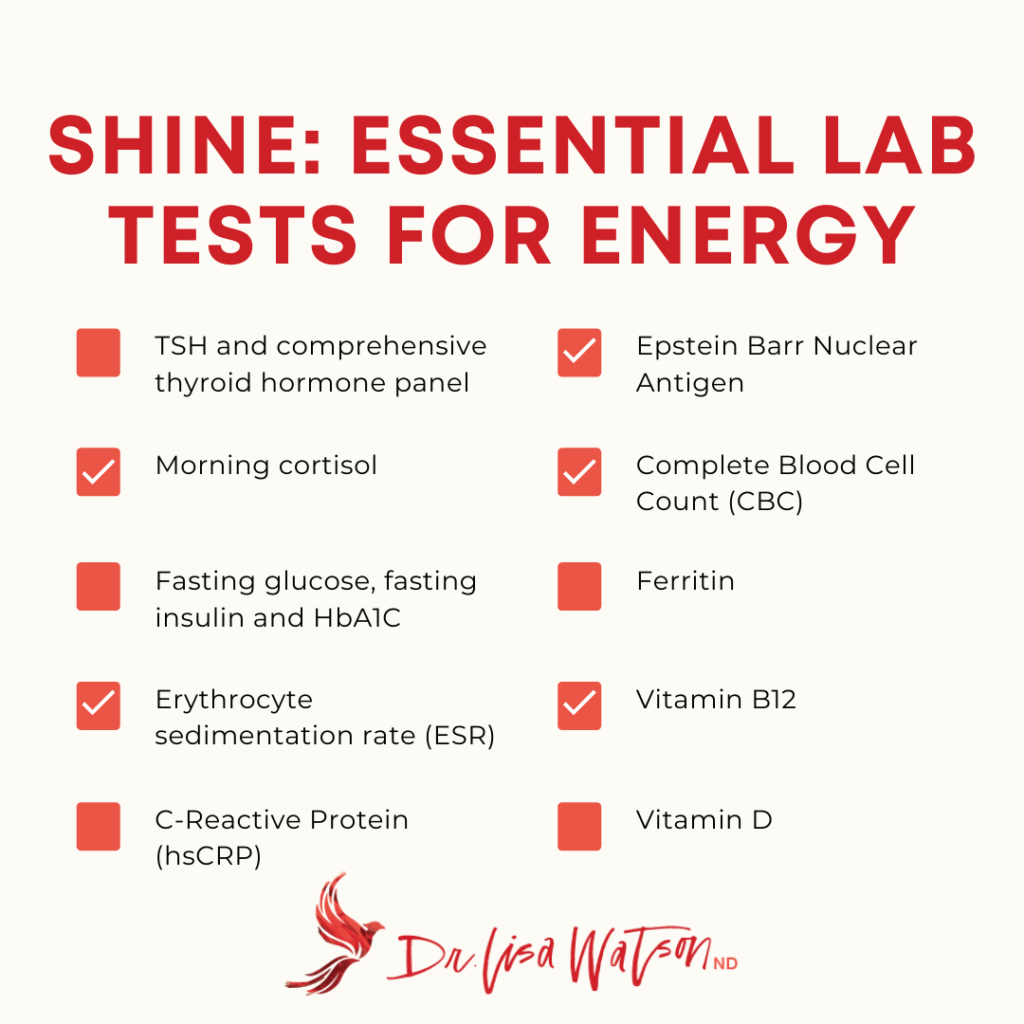
As we learn how to make our energy SHINE, one of the key pieces of information we need is comprehensive lab testing. Three of the key ingredients for SHINE, hormones, inflammation, and nutrition, are all reflected in essential lab tests that can help us to identify opportunities for improving our energy, and highlight any obstacles that may be standing in our way.

THE SHINE LAB TEST ESSENTIALS
HORMONES
TSH and the comprehensive thyroid panel
Thyroid hormones are one of the most important drivers of our energy. Necessary for our cells to use oxygen, no system in our body works smoothly without thyroid hormones. The most important test for thyroid is TSH (thyroid stimulating hormone) and if this hormone is even slightly outside the optimal range, I always suggest following up with a comprehensive thyroid panel to look at T4 and T3 – the main hormones produced by the thyroid gland – and autoimmune antibodies that determine if the thyroid is being harmed by the immune system.
Morning Cortisol
Cortisol, together with melatonin, regulate our daily energy levels. Cortisol rises in the morning, helping us to feel energized and ready to face the day. Because cortisol is also one of our powerful stress hormones, it is strongly influenced by our stress levels. If cortisol is too high, or too low, it can have significant impacts on our energy, mood, inflammation, and overall well being. It is one of the most important tests for the SHINE energy protocol. This test must be done at 8am.
Fasting Glucose, Fasting Insulin, and HbA1C
Blood sugar regulation is important for keeping our body energized with a steady state of our main fuel source – glucose. Unfortunately for many of us our bodies are provided with too many carbohydrates, causing our blood sugar and insulin levels to fluctuate wildly, leaving us tired, unmotivated, and craving more and more sugar. Fasting glucose, fasting insulin, and HbA1C (a measure of three month blood sugar stability) gives us the information we need to regulate these essential energy hormones.
INFLAMMATION
Erythrocyte Sedimentation Rate (ESR)
This mouthful of a test measures the speed at which red blood cells settle at the bottom of a test tube. How is that important you ask? Well it helps us to understand the level of inflammation that the red blood cells are exposed to. When inflammation happens, fibrinogen is released into the bloodstream in high amounts and causes red blood cells to stick together, which raises the ESR. This gives us a good overview of the overall inflammatory burden of the body. As inflammation is a crucial obstacle to identify and overcome for peak energy, ESR is a simple way of understanding its impact on our body.
High Sensitivity C-Reactive Protein (hsCRP)
Another measure of inflammation, CRP rises quickly with acute inflammation (like an injury or tissue damage) and drops quickly as well – it has a half life of only about 18 hours. When we measure CRP we can determine if there is on going inflammation in your body. If your CRP is increased we know that cells are being damaged due to inflammation, and if it stays high, we know the damage is still happening. Typically we will follow up an elevated CRP with further autoimmune testing.
Epstein Barr Virus (EBV)
The virus best known for causing mononucleosis, EBV is often a contributing factor for fatigue many years after exposure to the virus. Testing for the presence of the Epstein Barr Virus Nuclear Antigen can tell us if you have had mono previously, and if we need to support your immune system to keep the virus in its inactive latent state.
NUTRITION
Complete Blood Cell Count (CBC)
The CBC reflects the size, shape, and number of platelets, and red and white blood cells present in your blood stream. This can help us to identify nutritional deficiencies, such as low iron, low vitamin B12, and low folate. It also helps us to identify issues with inflammation, infection, allergies, and blood clotting disorders. Conditions that impact energy like anemia and thalassemia can be quickly identified with this simple test.
Ferritin
A measure of the stored form of iron, ferritin is one of the most common tests used to identify the underlying causes of low energy. Iron deficiency is the most common nutritional deficiency in children and adults. As iron is essential for the delivery of oxygen to our cells, even a mild iron deficiency can lead to fatigue symptoms.
Vitamin B12
Vitamin B12 is essential for the function of our nervous system, making red blood cells, and for driving energy production in our cells. Vitamin B12 deficiency is common as we get older, in people with digestive issues, in people who regularly consume alcohol, or use prescription medications (including antacids and diabetes medications), and in people who consume an exclusively plant based diet. As the number one symptom of low B12 is fatigue, this is an important nutrient to assess when exploring how to make your energy SHINE.
Vitamin D
Living in Canada, we are at increased risk for vitamin D deficiency during our long winters. Often called “the sunshine vitamin”, vitamin D is essential for bone health, immune system function, hormone balance, and anti-inflammatory activity in our bodies. Optimal vitamin D levels are important to maintain year round for our health and wellbeing. Unfortunately vitamin D levels are very rarely checked and current supplementation guidelines leave many of us with low vitamin D status. Vitamin D levels are typically checked in the fall (October) and winter (February), but can be checked at any time if there are concerns about your vitamin D.

Interested in understanding your energy better? Reach out. Let’s talk. I’m here to take you from feeling burnt out, to fired up!
Disclaimer
The advice provided in this article is for informational purposes only. It is meant to augment and not replace consultation with a licensed health care provider. Consultation with a Naturopathic Doctor or other primary care provider is recommended for anyone suffering from a health problem.














